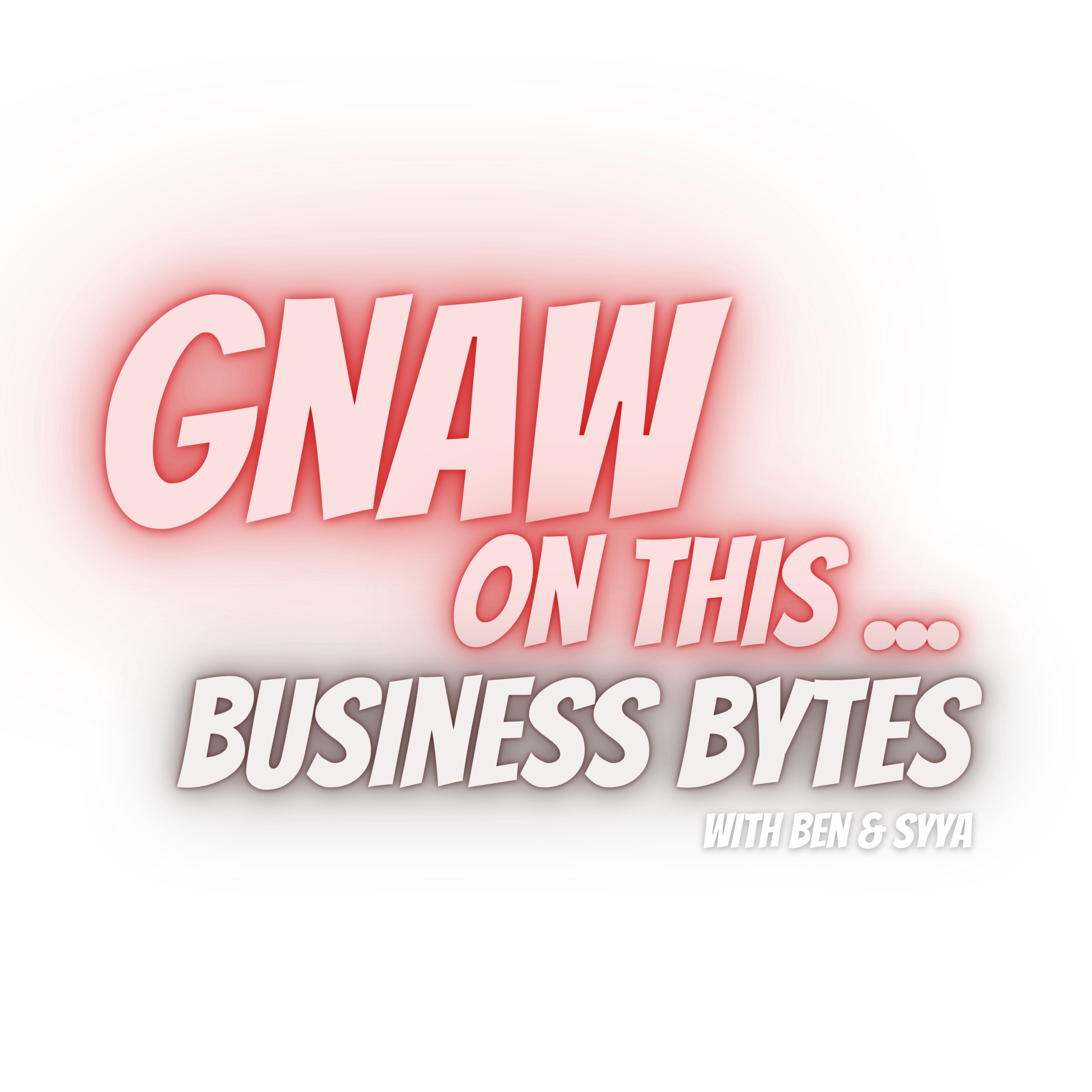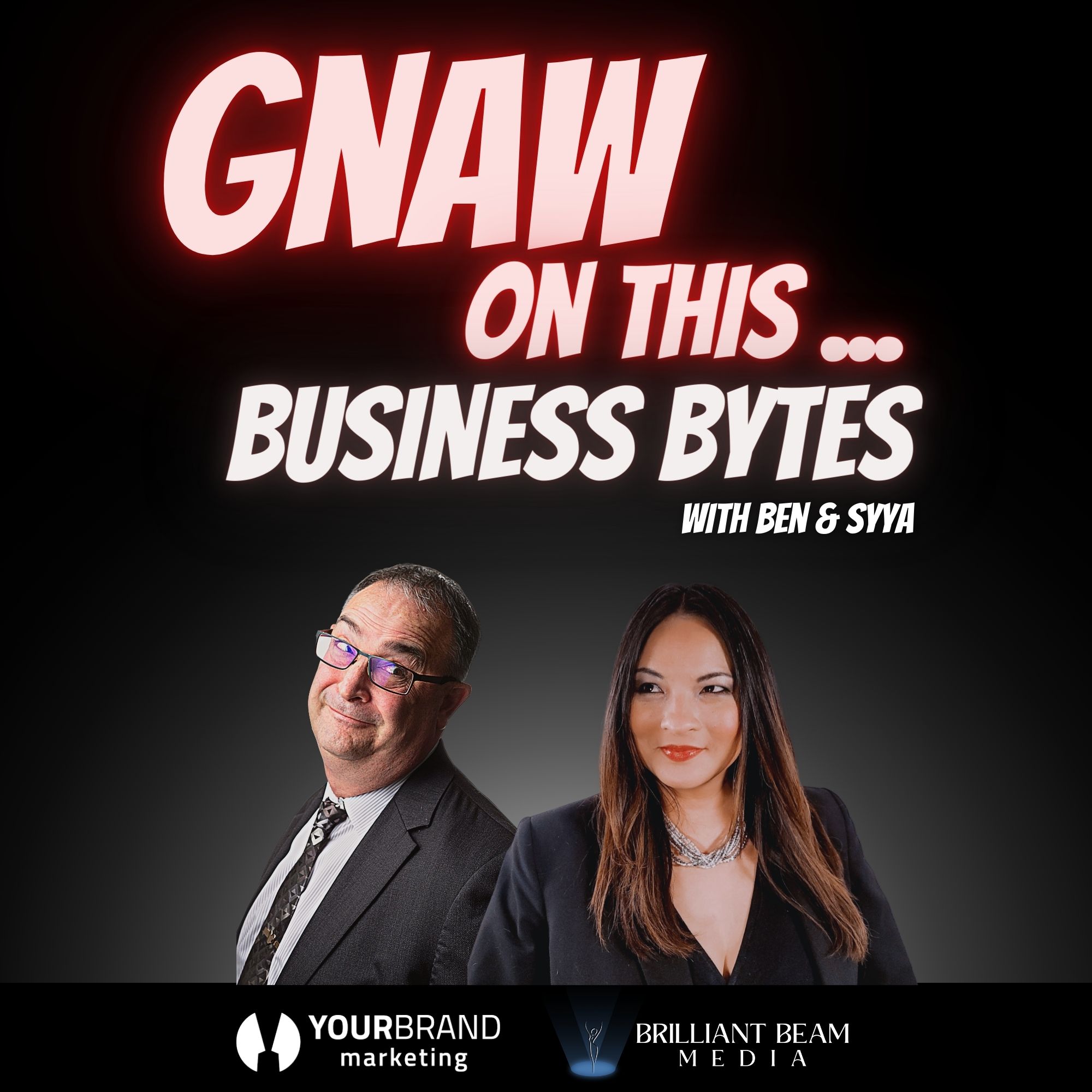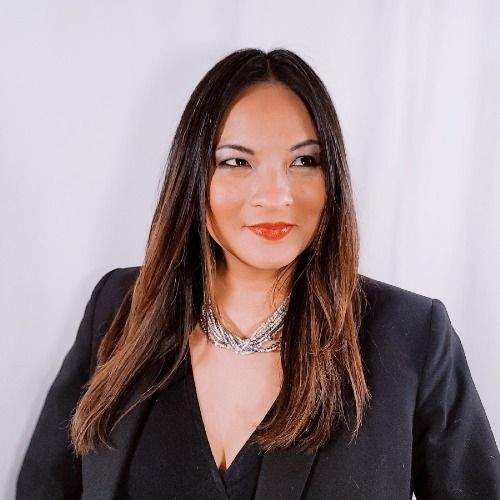Developing Company Culture
"Culture eats strategy for breakfast."
But does it?
Join Ben Baker and Syya Yasotornrat as they #GnawOnThis week's topic: How important is company culture to grow and thrive?
Gnaw on This...Business Bytes is a weekly TUESDAY livestream on topics we encounter everyday. Is it serious? Sometimes? Is it though provoking? Absolutely!
Learn More:
Gnaw On This LinkedIn: https://www.linkedin.com/company/gnaw-on-this-business-bytes-podcast/
Syya’s LinkedIn: https://www.linkedin.com/in/syyayasotornrat/
Syya’s Website: https://brilliantbeammedia.com/
Ben’s LinkedIn: https://www.linkedin.com/in/yourbrandmarketing/
Ben’s Website: https://yourbrandmarketing.com/
Transcript
0:00
about business and life is that people
0:01
are the X Factor they constantly
0:03
surprise us both in amazing ways and not
0:07
so much we're Ben Andia and welcome to n
0:10
on this business bites podcast this show
0:13
is all about real life things we all
0:15
deal with every day how they relate to
0:18
business and how to make some sense out
0:20
of our daily chaos welcome to the
0:24
[Music]
0:28
show
0:33
and welcome back to another episode of
0:35
non this business bites I'm Ben and this
0:38
is CA and this week I want to talk
0:43
about how to develop organizational
0:47
culture
0:49
culture no two cultures are the
0:52
same no two companies are the same
0:56
trying to be just like Google doesn't
0:59
work
1:00
work trying to be just like Netflix or
1:03
Amazon or even the company down the
1:06
street even if you do the exact same
1:10
thing is not going to work because my
1:14
people who work for my my company are
1:16
going to be different from the people
1:17
that work from your company my customers
1:19
are going to be slightly different from
1:21
your customers my my people are going to
1:23
want need fear and have
1:26
desires different from some other
1:29
company
1:30
we all need to look at culture as
1:34
something that we build individually
1:36
within our organization and it's going
1:38
to evolve over time you're not going to
1:42
build it
1:43
overnight it's not an absolute and it's
1:46
just like a website if you're not
1:49
continually looking at it if you're not
1:51
continually picking at it if you're not
1:54
continually building upon it it's going
1:57
to fall apart and we need to take a look
2:00
at culture that way is that it's
2:02
something that's continually evolving
2:04
something that we're constantly having
2:06
to look at and sit there and say is this
2:09
still relevant does this still work for
2:11
us is this still who we
2:14
are and then be able to do the hard work
2:17
to change things if the answer is no so
2:19
seea let's know on this oh I love this I
2:23
love this topic because it's it applies
2:25
to both small and large organizations so
2:27
I I worked for big companies I worked
2:29
for Disney I worked for hilet
2:31
Packard you can safely say those are
2:33
large organizations but I've also worked
2:35
for a mid- tier you know SMB size
2:38
company I worked for sonic wall which
2:39
had like less than:2:42
at the time when I was there I work for
2:44
my own company which is less than five
2:46
people right so I think I feel like I've
2:49
got this I've got this topic down
2:51
because I feel it so case in point um
2:56
you reminded me of uh my boyfriend
2:59
worked at this company so I'm going to
3:00
give a shout out to ignite Technologies
3:02
got bought up by sonic wall back in 25
3:04
years ago um it was 25 years ago how
3:08
crazy is that well you were 15 at the
3:10
time so yeah exactly I was 15 so uh the
3:14
thing about their company was uh so
3:16
Sonic well bought them they're reseller
3:18
Partners but they did manage uh security
3:22
and so they wanted that expertise of all
3:24
these Engineers who actually knew how to
3:27
be the Outsource right uh you know
3:29
management
3:30
for security and one thing I loved about
3:33
this group it was only 25 people in that
3:36
company small company but they managed
3:38
some really huge accounts um their
3:41
corporate culture their company culture
3:43
started at the Top If you will it was
3:46
started out by a group of friends and a
3:49
parent investor uh that were
3:52
extraordinary competent people and as
3:54
they
3:55
grew they brought in people that they
3:58
all knew they were all referrals so
4:00
again small company for 25 people it's
4:03
it's you know you should assume at some
4:05
point but they had some out PE out
4:07
Outsiders come in as well and what they
4:11
learned and what I observed was they
4:14
were a bunch of folks who probably
4:16
didn't know HR stuff that you can and
4:19
can't say but that they were learning it
4:21
together and they had the ability to
4:22
give each other Grace to learn and that
4:24
is part of their culture because they
4:26
were also Engineers solving big problems
4:29
they did it together and I think by
4:33
virtue of that job that they were doing
4:35
it just created this like um camaraderie
4:39
uh commiseration together when they're
4:41
like oh no something went down like they
4:43
all jumped in and pitched in to help
4:46
with their expertise uh that as they
4:48
grew even the outside hires kind of
4:51
caught on very quickly this company
4:52
isn't like alone wolf hero situation
4:56
this was all hands on deck when all
4:59
hands on deck needed to be made and I
5:01
loved and I always have loved that uh
5:04
camaraderie that they built up to the
5:05
point where now 25 years later we still
5:07
go meet up we still meet up everyone
5:10
spread out internationally but we will
5:11
meet up in Vegas like you know once a
5:13
year to just to be together again to me
5:15
that is a company culture that you want
5:17
to emulate over and over again and it's
5:20
sometimes difficult to scale that and I
5:22
think it's very difficult to scale that
5:24
and and how do you do that I thought I
5:26
thought hulet Packard actually as they
5:28
grew they really had a great company
5:30
corporate culture for a long time for as
5:33
long as it could sustain itself with the
5:36
economic conditions of Technology it did
5:39
evolve let's be honest it obviously has
5:41
and will always but there was when I
5:44
first joined in:5:48
n we'll just say some time ago there um
5:52
I felt the familial side of it like I
5:55
actually felt like the different
5:56
divisions there was a lot of desire to
5:58
be there and then I won't say whatever
6:01
reason but let's just say it it stopped
6:03
becoming that it it stopped being that
6:05
because we had to be
6:07
competitive and so let me ask you this
6:10
question now that I'm thinking about
6:11
this and I'm walking through the
6:13
process at what point does company
6:16
culture that you cultivate make your
6:19
company complacent and not
6:22
Innovative you know that that's an
6:24
interesting thing and before I get there
6:26
the question comes down to how are you
6:29
you growing are you growing organically
6:32
or are you going through
6:34
acquisition because when you grow
6:36
through acquisition you become a
6:38
Frankenstein company if you're not
6:40
careful it's very difficult to grow
6:44
through acquisition and not become a
6:46
Frankenstein company it's it's our
6:48
culture versus their culture because
6:50
very few companies on board the new
6:54
employees from the from the
6:56
acquisition effectively because they the
6:59
they'll sit there and they'll give you
7:00
your badge and they'll give you your
7:02
business cards and they'll give you your
7:03
desk and your phone and maybe a
7:06
territory but they don't onboard the
7:09
culture they don't spend the two weeks
7:12
needed to a month depending on where it
7:15
is actually getting people involved with
7:17
the culture and building a buddy system
7:21
between people that have been in the
7:22
culture for a while and people that are
7:24
new to the culture and bu helping them
7:27
build that bridge so that's that is I
7:30
find is a big Challenge and the bigger
7:32
the company gets the harder it gets and
7:35
that can lead to what you were saying
7:38
about companies you know losing their
7:41
Innovation because they you're dealing
7:44
with a variety of different cultures
7:46
that might have been in you know some of
7:48
them might have been Innovative some of
7:49
them might have been more conservative
7:51
some of them think this way some of them
7:53
think that way and therefore the culture
7:57
tends to evolve based upon the people
8:00
that are part of it and and quite
8:02
honestly the leadership if you have if
8:06
you have Innovative leadership if you
8:08
have risk you know risk tolerant
8:10
leaderships that have an ability to sit
8:12
there and say look we're going to change
8:14
we're going to evolve this is the beehag
8:16
we're going after this is the the big
8:18
hairy audacious goal these are the
8:20
things that we're aspiring to this is
8:22
why and this is what's we're going to
8:24
get to when we get
8:25
there then you can build doesn't matter
8:28
how big you are
8:30
the ab you have the ability to be able
8:32
to grow and be able to grow through
8:34
Innovation however most large companies
8:38
the bigger they get the more
8:39
conservative they get because they have
8:41
shareholders they have stakeholders they
8:44
have you know uh stock prices that
8:46
they're they're you know that they have
8:47
to justify every every 60 to 90 days you
8:51
know you have all those different
8:53
factors so as companies get
8:56
larger they lose their risk tolerance
8:59
and therefore they become more
9:00
conservative and therefore their culture
9:02
becomes more conservative you know they
9:04
also have layers upon layers upon layers
9:08
of
9:09
management yeah and therefore the
9:12
bureaucracy builds and as the
9:14
bureaucracy builds you either have a
9:16
small group of people that say Hey
9:18
listen better to ask for forgiveness
9:20
than
9:21
permission and those people are either
9:25
tolerated they're spun out or they're
9:28
given their walk
9:31
papers yeah okay so let's think about
9:35
this I I wonder and you made a big Point
9:39
here if we had the ability to cross
9:41
train like meaning all new hires as part
9:44
of their orientation is to work with a
9:45
different division different group and
9:47
learn their ways U maybe it's not a new
9:49
hire maybe it's like a six months into
9:51
the job thing like you got to learn your
9:53
job first right so maybe it might be
9:56
maybe it might be for the folks that
9:58
have been there a year they get an
9:59
opportunity to cross train you know what
10:01
I've never thought about this before
10:03
because I actually did this when I was
10:04
at Disney we got to cross train um with
10:06
the characters because uh when we first
10:10
uh worked with the Goofy's Kitchen
10:12
concept yes I was one of the OG Pilots
10:14
woohoo anyway yeah I done date myself
10:16
yet again uh but the character
10:20
department they were just like dudes you
10:22
can't be like pulling on me all the time
10:24
to get to your table and your restaurant
10:25
you know like we we have a process we
10:28
have to flow through you can't just be
10:29
yanking us all over the place because it
10:31
screws up the flow it screws up the the
10:33
organization of it right because all the
10:36
characters have to like sped their time
10:37
out right absolutely and uh I appreciate
10:43
that cross trading because I got to see
10:45
I got to live in their
10:47
shoe why do you think we don't see that
10:49
often enough okay that's my ultimate
10:50
questions why do you think we don't see
10:52
is it because we don't got time it's not
10:54
important enough what do you think I
10:56
think we don't make the time and we and
10:58
it's not just Justified and seen as
11:00
expens important enough people sit there
11:03
and say this cost money here's a perfect
11:06
example there's a company just
11:09
preco that I was working with and what
11:12
we were going to do is they had just
11:14
acquired they were 50,000 employee
11:16
company and they were just about to
11:18
acquire an 8,000 person company and they
11:22
were basically acquiring them for their
11:24
technology they they make no bones about
11:26
it they were they're buying them because
11:27
their technology
11:29
I said what's it going to cost you guys
11:31
to on board these people oh there' be
11:33
llions it's going to be about:11:36
millionar to onboard about $:11:38
person to onboard these people I said
11:41
okay if you don't onboard them properly
11:44
what we're going to lose now we'll lose
11:46
30% of these people you know easily
11:48
we'll lose 30% of the people I said can
11:51
I say that that's going to cost you you
11:53
know somewhere in the neighborhood of 80
11:55
to $100,000 a a person they said yeah
11:58
that's that's about right so say say
12:01
we're you know we're lose about 2,000
12:03
2,000 people at somewhere in the
12:06
neighborhood of 100,000 80 to 100,000 so
12:08
that's that's six that's $16
12:11
million so you know do we spend $24
12:14
million to save to save $16 million
12:17
that's the question what we proposed
12:19
instead was we created an internal
12:23
private and secure podcast that went out
12:25
to every single employee over three
12:28
years
12:29
and that
12:31
podcast was behind closed doors it was
12:34
stream only it wasn't on its pod Spotify
12:37
it wasn't on iHeart and it was designed
12:41
to build the cultural relationships to
12:43
get everybody to know each other to
12:44
understand why people do what they do
12:47
what do different departments do what's
12:48
important to them how do they how does
12:50
things get passed from one to the other
12:52
and the
12:53
ideology and this was going to cost them
12:56
somewhere in the neighborhood of 10%
12:59
of what it would have cost them to do a
13:01
traditional on board over three years so
13:04
instead of a oneandone it was it was a
13:07
three-year program it was going to cost
13:09
them
13:10
10% and we were all set to go ahead with
13:12
this and then Co came and other
13:14
priorities obviously came the thing but
13:16
the problem is companies don't
13:20
realize what it cost them to not have
13:26
Harmony within the company to to not
13:28
have people understanding why people do
13:31
what they do who the top customers are
13:34
and why what are the what are the pain
13:36
points of the
13:38
customers yeah think of what happened if
13:40
if your operations people understood who
13:43
your top 10 clients were what their pain
13:45
points are what these people did and who
13:47
they
13:48
served do you think that would change
13:51
the way that that that the stuff got
13:53
pick packed and shipped and and and sent
13:55
out and and the level of care and the
13:57
level of attention that God done I think
13:59
it would so we need to take a look at
14:02
say at this is is not just you know a
14:07
singularity but how does it affect how
14:10
does the culture and how does this
14:12
affect the organization as a
14:15
whole you know you just got me thinking
14:17
on that like I'm a huge fan of internal
14:21
podcasts um more so than external facing
14:24
because it's they serve different
14:25
purposes first off right Walmart
14:28
actually has
14:29
an it was originally started as an
14:31
internal podcast that they started
14:32
playing over like like now they call it
14:35
the Walmart radio yep and it's like you
14:37
know hey meet your Regional director and
14:39
all that stuff but you know what you
14:41
also remind me of is like
14:43
that maybe competitive Spirit but there
14:46
was a again a a camaraderie between
14:51
departments when you do you like
14:53
decorate your Christmas tree competition
14:55
you know what I mean and it's like each
14:57
department had their own little thing
14:59
and then everyone would just parade
15:00
around and check each other's out right
15:02
now granted if you're a huge company you
15:04
can still absolutely do it by just doing
15:06
a video competition of your own said you
15:09
know how do you celebrate the holidays
15:10
and
15:11
whatnot it's such a simple Act of just
15:14
giving a moment of reprieve outside of
15:16
your daily task to let your mind wander
15:19
and have some fun that I think I think
15:23
is I think is what's needed to to help
15:27
build that culture of you know I'm not
15:29
saying it's got to be fun times Party
15:31
Times all the time but it's got to be a
15:33
but there ain't nothing wrong with
15:34
having a little fun every now and then
15:36
either right but but a culture and and
15:38
we we should end with this is that a
15:40
culture doesn't always have to be
15:43
Kumbaya no there are cultures out there
15:46
that are hard grinding hard-hitting you
15:50
know business business-only
15:52
cultures and they attract people that
15:55
that's the type of business that they
15:56
want to be in exactly and and there's
15:59
nothing wrong with them if if that if
16:01
you self- select into that culture and
16:03
you sit there and say you know what I'm
16:06
not into this woke stuff I'm not into
16:08
this fairy dust I you know I want to
16:10
work for a company that's serious people
16:12
doing serious things you know to hang
16:15
with political correctness I you know we
16:17
just we just work and we have a lot of
16:19
fun together and you know and we're and
16:22
and everybody works hard and plays hard
16:24
that's a different type of culture 100
16:27
you know what 100% tracks a certain
16:29
level of people so not every culture has
16:32
to be this Kumbaya hold hands and and
16:35
and and go you know go uh you know uh uh
16:39
canoeing together culture there there's
16:41
all sorts of cultures for all sorts of
16:43
companies and what the culture should do
16:46
is not only self- select but self-
16:51
deflect
16:52
interesting I feel like we keep talking
16:54
I know we're running way over time so so
16:57
there we go so we we'll leave it there
16:59
so I'm Ben and I'm seea and we'll see
17:02
you
17:04
soon hey hey hey thanks for listening to
17:07
another episode of not on this business
17:10
fights if you liked what you heard we
17:13
most humbly ask that you like share and
17:16
hit that subscribe button if you want to
17:18
communicate more effectively within your
17:20
organization contact Ben atyou brandmark
17:24
tocom or me at brilliant beam media.com
17:28
we can help you build your community
17:30
brand awareness and personality through
17:33
digital content and podcasting we cannot
17:36
wait to hear from you so see you next
17:38
week for another episode of not on this
17:42
business
17:49
fights



